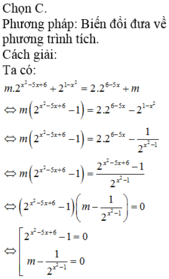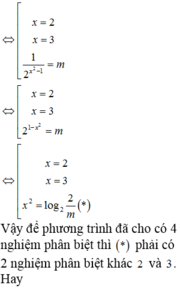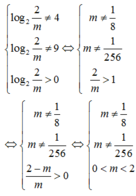Cho phương trình m . 2 x 2 - 5 x + 6 + 2 1 - x 2 = 2 . 2 6 - 5 x + m . Tìm tất cả các giá trị thực của tham số m để phương trình có 4 nghiệm phân biệt
![]()
![]()


Hãy nhập câu hỏi của bạn vào đây, nếu là tài khoản VIP, bạn sẽ được ưu tiên trả lời.





1, Thay m=6 vào pt ta có:
\(x^2-\left(6-2\right)x-6+5=0\\ \Leftrightarrow x^2-4x-1=0\)
\(\Delta=\left(-4\right)^2-4.1.\left(-1\right)=16+4=20\)
\(x_1=\dfrac{4+2\sqrt{5}}{2}=2+\sqrt{5},x_2=\dfrac{4-2\sqrt{5}}{2}=2-\sqrt{5}\)
\(2,\Delta=\left[-\left(m-2\right)\right]^2-4\left(-m+5\right)\\ =m^2-4m+4+4m-20\\ =m^2-16\)
Để pt có 2 nghiệm phân biệt thì
\(\Delta>0\\ \Leftrightarrow m^2-16>0\\ \Leftrightarrow\left[{}\begin{matrix}m>4\\m< -4\end{matrix}\right.\)

a) Thay m=1 vào phương trình, ta được:
\(x^2-6\cdot x+5=0\)
a=1; b=-6; c=5
Vì a+b+c=0 nên phương trình có hai nghiệm phân biệt là:
\(x_1=1;x_2=\dfrac{c}{a}=\dfrac{5}{1}=5\)
b) Ta có: \(x^2-\left(m+5\right)x-m+6=0\)
a=1; b=-m-5; c=-m+6
\(\Delta=b^2-4ac\)
\(=\left(-m-5\right)^2-4\cdot1\cdot\left(-m+6\right)\)
\(=\left(m+5\right)^2-4\left(-m+6\right)\)
\(=m^2+10m+25+4m-24\)
\(=m^2+14m+1\)
\(=m^2+14m+49-48\)
\(=\left(m+7\right)^2-48\)
Để phương trình có hai nghiệm phân biệt thì \(\left(m+7\right)^2\ge48\)
\(\Leftrightarrow\left[{}\begin{matrix}m+7\ge4\sqrt{3}\\m+7\le-4\sqrt{3}\end{matrix}\right.\Leftrightarrow\left[{}\begin{matrix}m\ge4\sqrt{3}-7\\m\le-4\sqrt{3}-7\end{matrix}\right.\)
Vì x1,x2 là hai nghiệm của phương trình (1) nên ta có:
\(\left\{{}\begin{matrix}x_1^2-\left(m+5\right)x_1-m+6=0\\x_2^2-\left(m+5\right)x_2-m+6=0\end{matrix}\right.\)
\(\Leftrightarrow\left\{{}\begin{matrix}x_1^2=\left(m+5\right)x_1+m-6\\x_2^2=\left(m+5\right)x_2+m-6\end{matrix}\right.\)
Ta có: \(x_1^2+x_1\cdot x_2^2=24\)
\(\Leftrightarrow\left(m+5\right)x_1+m-6+x_1\cdot\left[\left(m+5\right)x_2+m-6\right]=24\)
\(\Leftrightarrow\left(m+5\right)x_1+m-6+\left(m+5\right)\cdot x_1x_2+x_1\left(m-6\right)=24\)
Xin lỗi bạn, đến đây mình thua
a, khi m=1
\(=>x^2-6x+5=0\)
\(=>a+b+c=0=>\left[{}\begin{matrix}x1=1\\x2=5\end{matrix}\right.\)
b,\(\Delta=\left[-\left(m+5\right)\right]^2-4\left(-m+6\right)=m^2+10m+25+4m-24\)
\(=m^2+14m+1=m^2+2.7m+49-48\)\(=\left(m+7\right)^2-48\)
pt (1) có nghiệm \(< =>\left(m+7\right)^2-48\ge0\)
\(< =>\left[{}\begin{matrix}m\ge-7+4\sqrt{3}\\m\le-7-4\sqrt{3}\end{matrix}\right.\)
theo vi ét \(=>\left\{{}\begin{matrix}x1+x2=m+5\\x1x2=-m+6\end{matrix}\right.\)
tui nghĩ là đề thế này \(x1^2x2+x1x2^2=24=>x1x2\left(x1+x2\right)=24\)
\(=>\left(6-m\right)\left(m+5\right)=24\)
\(< =>-m^2-5m+6m+30-24=0\)
\(< =>-m^2+m+6=0\)
\(\Delta=1^2-4\left(-1\right).6=25>0\)
\(=>\left[{}\begin{matrix}m1=\dfrac{-1+\sqrt{25}}{2\left(-1\right)}=-2\left(loai\right)\\m2=\dfrac{-1-\sqrt{25}}{2\left(-1\right)}=3\left(tm\right)\end{matrix}\right.\)


Ta có:
2(a − 1)x − a(x − 1) = 2a + 3
⇔(a − 2)x = a + 3 (3)
Do đó, khi a = 2, phương trình (2) tương đương với phương trình 0x = 5.
Phương trình này vô nghiệm nên phương trình (2) vô nghiệm.

a.
\(3\sqrt{-x^2+x+6}\ge2\left(1-2x\right)\)
\(\Leftrightarrow\left[{}\begin{matrix}\left\{{}\begin{matrix}-x^2+x+6\ge0\\1-2x< 0\end{matrix}\right.\\\left\{{}\begin{matrix}1-2x\ge0\\9\left(-x^2+x+6\right)\ge4\left(1-2x\right)^2\end{matrix}\right.\end{matrix}\right.\)
\(\Leftrightarrow\left[{}\begin{matrix}\left\{{}\begin{matrix}-2\le x\le3\\x>\dfrac{1}{2}\end{matrix}\right.\\\left\{{}\begin{matrix}x\le\dfrac{1}{2}\\25\left(x^2-x-2\right)\le0\end{matrix}\right.\end{matrix}\right.\)
\(\Leftrightarrow\left[{}\begin{matrix}\dfrac{1}{2}< x\le3\\\left\{{}\begin{matrix}x\le\dfrac{1}{2}\\-1\le x\le2\end{matrix}\right.\end{matrix}\right.\)
\(\Rightarrow-1\le x\le3\)
b.
ĐKXĐ: \(x\ge0\)
\(\Leftrightarrow\sqrt{2x^2+8x+5}-4\sqrt{x}+\sqrt{2x^2-4x+5}-2\sqrt{x}=0\)
\(\Leftrightarrow\dfrac{2x^2+8x+5-16x}{\sqrt{2x^2+8x+5}+4\sqrt{x}}+\dfrac{2x^2-4x+5-4x}{\sqrt{2x^2-4x+5}+2\sqrt{x}}=0\)
\(\Leftrightarrow\dfrac{2x^2-8x+5}{\sqrt{2x^2+8x+5}+4\sqrt{x}}+\dfrac{2x^2-8x+5}{\sqrt{2x^2-4x+5}+2\sqrt{x}}=0\)
\(\Leftrightarrow\left(2x^2-8x+5\right)\left(\dfrac{1}{\sqrt{2x^2+8x+5}+4\sqrt{x}}+\dfrac{1}{\sqrt{2x^2-4x+5}+2\sqrt{x}}\right)=0\)
\(\Leftrightarrow2x^2-8x+5=0\)
\(\Leftrightarrow x=\dfrac{4\pm\sqrt{6}}{2}\)